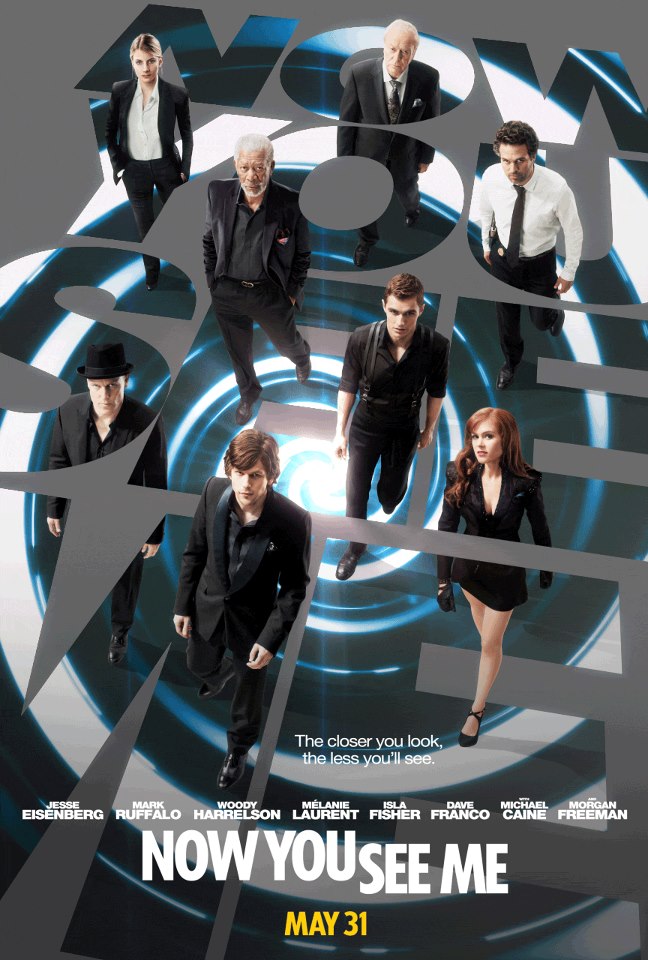

Director: Louis Leterrier, 2013 (PG-13)
Now You See Me is
razzle-dazzle fun, a Vegas-type of entertainment: not much depth, but plenty of
showmanship on display. Leterrier brings magic and hectic chase to the
caper-heist genre and manages to captivate the attention despite the escalating
ridiculousness and multiple plot holes.
The film focuses on four street magicians each given a
mysterious summons to an obscure New York apartment where their lives are
changed by an unknown benefactor. One year later they are calling themselves
“The Four Horsemen” and playing a show in Vegas itself, a huge step-up for
these illusionists.
Eight people share the spotlight in this film, none of whom
have any real depth of character. J.
Daniel Atlas (Jesse Eisenberg, TheSocial Network) is an old-fashioned sleight-of-hand magician, and the
apparent leader of the group. Henley Reeves (Isla Fisher, Confessions of a Shopaholic), his former assistant, is a
Houdini-like escape artist, but much prettier. Woody Harrelson plays Merritt
McKinney, a mentalist or hypnotist, scamming adulterers to make a living. Dave
Franco, brother of James, plays the fourth horseman, Jack Wilder, a street-wise
con man. Helping them is millionaire businessman Arthur Tressler (Michael Cain,
Inception). Trying to catch them,
however, is FBI Agent Dylan Rhodes (Mark Ruffalo, The Kids are All Right) supported by beautiful Interpol Agemt Alma
Dray (Melanie Laurent, Beginners).
The final character is Thaddeus Bradley (Morgan Freeman, The Bucket List), a magician-turned-debunker, who now makes
millions showing TV audiences how the magic tricks are pulled off. Bradley acts
as a narrator of sorts, to help us the movie audience follow along. And this is
needed, as the movie is quite complicated, with multiple twists and turns.
 The Vegas show climaxes with a trick that has a random
audience member, French as it turns out, teleported to his bank in Paris to
pull off a multi-million Euro robbery. When the money is floated down over the
Vegas audience, they applaud but the authorities are embarrassed. They cannot
argue that a crime was perpetrated by magic. But they cannot understand how it
was done. Hence they call in Bradley. And Rhodes does not want an Interpol
agent on his team, but is forced to make do.
The Vegas show climaxes with a trick that has a random
audience member, French as it turns out, teleported to his bank in Paris to
pull off a multi-million Euro robbery. When the money is floated down over the
Vegas audience, they applaud but the authorities are embarrassed. They cannot
argue that a crime was perpetrated by magic. But they cannot understand how it
was done. Hence they call in Bradley. And Rhodes does not want an Interpol
agent on his team, but is forced to make do.
Two other flamboyant magic acts are queued up, each bigger
and more deceptive than before. Each leads to further plot trickery. But after act one, in essence the film becomes
one long chase, with the FBI always one step behind. Along the way, a
subordinate plot-line related to a supernatural group, “The Eye”, is introduced
which makes little sense and adds little value, but the sheer energy and
enthusiasm carries us along unthinkingly, as all good magic should.
 When the climax occurs, the mysterious stranger from the
introduction is revealed, and we want to reflect back on how it all played out.
The film does this, to some degree, but not in enough detail. It warrants a
second viewing, but that one might disappoint compared to seeing the magic of
the first viewing. It’s all an illusion.
When the climax occurs, the mysterious stranger from the
introduction is revealed, and we want to reflect back on how it all played out.
The film does this, to some degree, but not in enough detail. It warrants a
second viewing, but that one might disappoint compared to seeing the magic of
the first viewing. It’s all an illusion.
Indeed, J. Daniel Atlas tells the FBI (and hence us) this in
several scenes. In one, he says, “What is magic? Focused deception. But
deception meant to entertain.” In another he declares, “The more you look, the
less you see.” And in another, “The closer you think you are, the less you’ll
actually see.”
This concept reminds us of Satan, the great deceiver himself.
“Satan himself masquerades as an angel of light.” (2 Cor. 11:14) He wants to
tempt us to partake in the guilty pleasures of sin (Heb. 11:25). Through this
entertainment, we think we are enjoying ourselves, but in reality we are
digging our own graves. Satan’s focused deception is intended to draw our
attention away from Jesus Christ, the pioneer and perfecter of our faith (Heb.
12:1). The more we look at Satan’s
glitzy baubles tantalizingly dangled in front of our faces, the less we see. But
we become blinded to the truth. Only in and through Jesus, can Satan’s magic be
exposed for what it really is: an illusion. Unlike Now You See Me, Satan’s
great deception in life ultimately leads to death. A second viewing is not what
is needed. A savior is.
Copyright ©2013, Martin Baggs

No comments:
Post a Comment